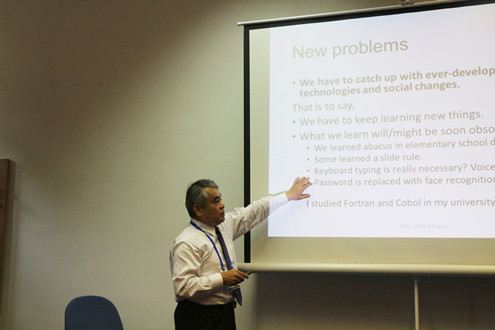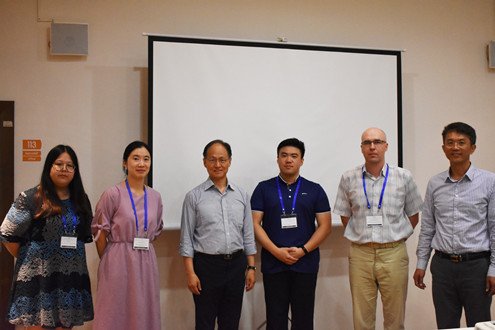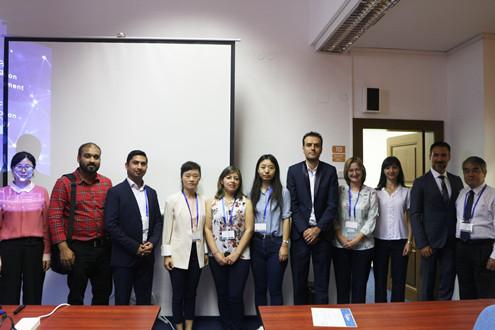ICKET 2019 | August 23-26, 2019 | Prague, Czech Republic
ICKET has been held since 2012. In 2019, we witnessed ICKET another success again. We are pleased to have accepted 63 presentations (initially from 108 submissions) coming from 27 regions and countries including Brazil, Brunei, Bulgaria, China, Czech Republic, Ecuador, France, Greece, Hong Kong, India, Indonesia, Israel, Japan, Jordan, Kuwait, Morocco, Nigeria, Norway, Pakistan, Poland, Russia, South Africa, South Korea, Switzerland, Taiwan, Thailand, United Kingdom.
The presentations are divided into 1 poster session and 6 parallel sessions. Prof. Alexander Balinsky from Cardiff University, United Kingdom; Prof. Jalel Ben-Othman from University of Paris 13, France; Prof. Kazumasa Oida from Fukuoka Institute of Technology, Japan; Prof. Atour Taghipour from University of LeHavre, France; Prof. Hiroyuki Kameda from Tokyo University of Technology (TUT), Japan delivered the keynote speeches during the conference.
Every presenter also performed a good presentation and take an active in share and discussion.
We’d like to express our heartfelt appreciation to our chairs, sponsors, technical program committee members, organizing committee members, authors and delegates, who made a lot of efforts and contributions year by year. Thanks to your support and help, we can hold this conference successfully and always keep making progress.
|
|
|
KEYNOTE SPEAKERS
 Prof. Alexander Balinsky from Cardiff University, United Kingdom delived a speech on Mathematics of Deep Learning. In this talk, he presented mathematical foundations of Deep Learning, relations with physics, features extraction and interpretability. And also explain mathematics behind adversarial attacks and how to protect against them. Several new mathematical problems will be presented. |
 Prof. Jalel Ben-Othman from University of Paris 13, France had a talk on Threats and solutions for connected vehicles in Cyberspace In this keynote, he presented issues about availability problem in those networks and architecture, he also focused on Vehicular Networks, and showed some works we have done and other works to improve security in those systems. |
|
|
Information diffusion in
online social networks has been extensively studied by many
researchers because a widespread diffusion phenomenon
occasionally occurred paving the way for other phenomena, such
as public opinion formation or rapid growth of video viewers.
This research has also been related to using social networks for
viral marketing. |
 Prof. Atour Taghipour from University of LeHavre, France who did a speech on Goal setting and planning : an action framework Goal setting is the first step towards success. However, goals can only be reached through a vehicle of a plan. During this speech, we explain the main steps necessary to set the goals. Then, using the result of our research, we show that motivation isn’t the key to achieving the goals and what drives us to to achieve the fixed goals is planning. The presented method can be used by individuals to achieve their objectives.
|

Prof. Hiroyuki Kameda
Tokyo University of Technology (TUT), Japan
Speech Title---A Challenge for New Education in
Computer Science
How to develop the ability for students to learn sustainably in a
fast-changing society
Speech Abstract--- As you'd know, mankind has already
experienced three Industry Revolutions which were driven by the
invention of steam engines, stable supply of electric power, and the
Internet ( the open information high way). The first one happened around
between the last half of the seventeenth century and the first half of
the eighteenth century, the second one at the first half of the
twentieth century, and the third one at the last half of the twentieth
century. And now, just at the beginning of the 21st century, a new
industrial revolution is happening just by artificial intelligence (Deep
Learning), Big Data, Blockchain. These facts show the interval of
industrial revolutions is becoming shorter and shorter. On the other
hand, modern sciences, for example, life science, medicine and so on
make our life span longer and longer than before. For example, in Japan,
some researchers say the life span of Japanese, especially, of women,
will reach 100 years. Whether it is true or not, young people in this
century must keep leading a healthy and happy life in a changeable
society for a long time. Especially for students in Computer Science,
what they are just now studying hard at school might be partially
useless in several years. In such a situation, education plays a very
important role for young students, and should inevitably change to
establish a new way of learning for young people in the next young
generation.
In this presentation, the speaker, a Professor of computer science,
shows some case studies of computer science education in Tokyo
University of Technology, addressing both social background in Japan and
problems of the school of computer science in the university. A new
on-going educational trial also is presented in some details. One is a
workshop course in which students create a well-selling game software
from game concepts creation through game implementation to a
presentation of selling campaign. The other is the software application
planning of sightseeing promoting campaign for Hachioji City, where
their university lies.
The conclusions are as follows; the essences of education in the 21st
century are that teachers should lead students to learn in an effective,
tailor-made way, and that students should learn how to learn sustainably
in one’s own way.
Session Group Photo Gallery
 Session 1-Data Mining Paper Title: FinMARS: A Mobile App Rating Scale for Finance Apps Presenter: Carlo Schmid Affiliation: ETH Zurich, Switzerland |

Session 2- Education Science |
 Session 3: Machine Learning Applications Paper Title: Energy-Efficient Associations for IoT networks with UAV: A Regret Matching Based Approach Presenter: Abdellatif Kobbane Affiliation: ENSIAS, Mohammed V University, Rabat, Morocco |

Session 4- Software Engineering |
 Session 5-Pattern Recognition and Classification Paper Title: Changes in online user behavior: Generation Alpha Presenter: Riaan Rudman Affiliation: Stellenbosch University, South Africa |

Session 6-Electronic Technology Applications |




